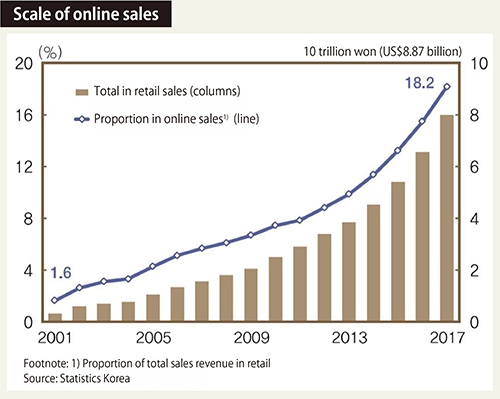Posted on : Dec.12,2018 17:18 KST
 |
|
Scale of online sales
|
Growth of online shopping inevitably has negative effects on hiring
The term “Amazon effect,” named after the global e-commerce giant Amazon, is used to refer to the check on inflation as online shopping develops. Indeed, items can be purchased more cheaply online than off, with no need to go through a middleman and an intense competition environment where prices can be compared in real time.
But the growth of online business also has an inevitably negative effect on hiring, especially for wholesale and retail businesses. In a first-ever empirical research report, the Bank of Korea (BOK) found that the growth of online shopping has resulted in an average annual decrease of 0.2 percentage points in the inflation rate and the loss of 16,000 jobs.
On Dec. 11, Kim Tae-gyeong, Park Dong-joon and Choi In-hyeop, senior researchers at the BOK Research Department, published a report titled “Ripple Effects from the Increase in Online Transactions and Their Implications.” Their research found that the rate of increase in product prices fell by 0.08–0.1 percentage points and the underlying inflation rate (not including energy or food prices) by 0.02–0.03 percentage points for a given year for every percentage-point increase in the proportion of online product sales. With the increased percentage of online product sales, the numbers mean that the underlying inflation rate fell by an estimated average of 0.2 percentage points per year between 2014 and 2017.
 |
|
Contributors to increases in retail sales
|
The researchers also analyzed the effect of increased online transactions on sales and hiring for wholesale and retail businesses. With each percentage-point increase in online sales was found to be associated with a 0.7 percentage-point decline in offline sales for the same quarter. When the wholesale/retail employment inducement coefficient (21 jobs per billion won, or US$886,305) was factored in, the number of jobs in the wholesale/retail sector was found to have decreased by an average of around 16,000 each year since 2014, as increasing online transactions have taken the place of offline sales.
At the same time, the report noted that “calculations reflect only the decline in employment at offline wholesale and retail businesses and do not reflect increased employment in corresponding areas with the increase in online transactions.”
Online transactions in South Korea have increased at a fast rate since 2014 thanks to increased smartphone usage and the promotion of simplified payment systems. The average contribution of online sales to increased retail sales more than quadrupled from 19.6% for 2002–2013 to 83.9% 2014–2017. Last year saw a total of 80 trillion won (US$71 billion) in online sales in South Korea, representing 18.2% of all sales (440 trillion won/US$390 billion). Rising by more than ten times from 1.6% in 2001, the percentage is slightly lower than those in China (23.1%) and Great Britain (19.1%) but markedly higher than in other advanced economies such as the US (9%), Germany (7.9%) or Japan (7.4%).
Many have argued that the Amazon effect is at least partly responsibility for low hiring and stagnating inflation despite the recovery in private consumption since the second half of last year,” explained Kim Tae-gyeong.
“This report is significant in being the first in South Korea to empirically analyze this phenomenon and present it in statistical data,” Kim added.
The Amazon effect of increased online shopping serving to control rising prices has been a global phenomenon and a focus of research around the world. It has also been pointed to as the chief reason the US has recently maintained stable prices while enjoying its own boom.
By Lee Soon-hyuk, staff reporter
Please direct comments or questions to [english@hani.co.kr]










